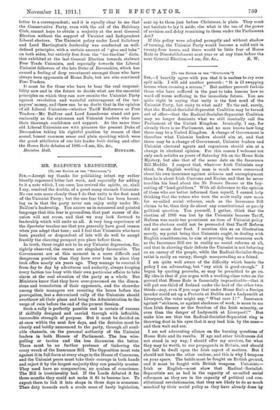[To THE EDITOR OP THE "SPECTATOR.""
SIR,—I heartily agree with you that it is useless to cry over spilt milk. I will add another proverb : " It is ill swapping horses when crossing a stream." But neither proverb forbids those who have suffered in the past to take lessons how to ward off worse suffering in the immediate future. You are quite right in saying that unity is the first need of the Unionist Party, but unity to what end? To the end, surely, that the Radical-Socialist-Separatist Coalition may be turned out of office—that the Radical-Socialist-Separatist Coalition may no longer dominate what we still ironically call the Parliament of the United Kingdom. Ironically, I say, for already there is no Parliament, and no man knows how long there may be a United Kingdom. A change of Government is therefore what Unionist leaders should aim at, and that there may be a change of Government, Unionist leaders and Unionist electoral agents and organizers should aim at a change in electoral opinion. For this reason I welcome not only such articles as yours of Saturday 4th on the Home Rule Mystery, but also that of the same date on the Insurance Bill Muddle. I suspect that, whatever Irish Unionists may think, the English working man is much more concerned about his own insurance against sickness and unemployment than he is about Irish Customs and Excise, and that he never troubles his head about the Ne Temere Decree or the boy- cotting of "land-grabbers." With all deference to the opinion of those who are better informed than myself, I cannot help thinking that the voters who turn the scale really care more for so-called social reforms, such as the Insurance Bill claims to be, than they do about any constitutional or purely political question. You yourself, I gather, think that the election of 1906 was lost by the Unionists because Tariff, Reform was made too prominent an item of Unionist policy and the electors could not be persuaded that Tariff Reform did not mean dear food. I mention this as an illustration merely, my point being that Unionists ought, in dealing with English constituencies, to aim at proving that measures such as the Insurance Bill are in reality no social reforms at all, and that in showing their defects the Unionist is not behaving as an enemy of the people, while the Radical-Socialist-Sepa- ratist is really an enemy, though masquerading as a friend.
I am quite well aware of the difficulty which besets the policy I am advocating, but "any stick is good enough." I began by quoting proverbs, so may be permitted to go on. My idea is that if you argue with a working-class voter on the ground that Home Rule is financially impracticable—that it will put one-third of Ireland under the heel of the other two- thirds—nay, even if you urge that under Home Rule a foreign invader could set up a Pretoria at Dublin and a Ladysmith at Liverpool, the voter might say, " What care I I" Insurance against " sickness, or against slackness of work, is more to me than Irish finance or the freedom of the Irish minority, or even than the danger of Ladysmith at Liverpool l" But make him see that the Radical-Socialist-Separatist ring is throwing dust in his eyes that it may lead him by the nose—. and then wait and see.
I am not advocating silence on the burning questions of Home Rule and its results. If age and other hindrances did not stand in my way, I should offer my services, for what they may be worth, to our propaganda in Britain, and should not fail to dwell upon the Irish aspect of matters. But I should not leave the other undone, and this is why I trespass on your space. The battle must be fought on British ground, and it must be fought with British weapons. Unionists— Irish or English—must show that Radical - Socialist- Separatists are as bad in the capacity of so-called social reformers as they are in the capacity of political and con- stitutional revolutionaries, that they are likely to do as much mischief by their social policy as they have already done by
their revolutionary devices. Heaven grant that it be not irre-
parable !—I am, Sir, &c., SANS CHANGER. [We have retained these letters on "Mr. Balfour's Leader- ship," as their interest is not really impaired by the fact of his resignation.—En. Spectator.]



















































 Previous page
Previous page